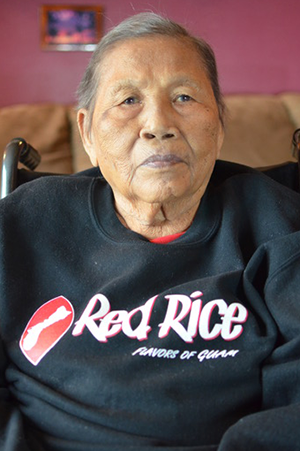Shrimp, breadfruit, and banana: The taste of occupation

Maria Babauta Taitague Escalera (1930 – ) was born to Candida Babauta Taitague from Hågat and Asuncion Cruz Taitague from the Inarajan (Familian Pomparu). Escalera’s mother died when she was three-years-old, so she and her siblings, Thomas, Delfina and Jose, were raised (pokasi) by their oldest sister Ana – whom they called Nåna – and her husband Manuel Quintanilla – called Tåta.
When the Japanese invaded Guam on 8 December 1941, the Taitague family fled from Mass at the church in Hågat to their ranch in Lagute, where Naval Magazine is now.
Delfina was taken by Uncle Felix and Aunt Alejandra Manalisay – Cadida’s sister – to Malesso’, where she spent the war planting rice.
Escalera attended the Japanese school in Hågat, a 10-minute walk from their home, where she was taught Japanese by a CHamoru teacher.
When you pass by the sensi, you have to bow or they slap you. I never learned Japanese, except ‘konbanwa,’ which means hello.
Maria Babauta Taitague Escalera
In the classroom, the children dared each other to hum the tune to “Uncle Sam,” until they were scolded by the teacher.
The men were taken to clear the airport runway, but not everyday, and they were able to come home at night. When they left, the children were told to hide in a cave. Sometimes to avoid the work, Manuel would intentionally get stung by bees and disable himself. Whenever the Japanese had him move bags of rice, he filled his pockets with whatever he could and snuck it back to the family.
When she thinks about the war, Escalera’s strongest memories are of the foods she ate and the foods the Japanese soldiers took from their farm, the ripest bananas and pigs.
We’re eating rice and my father sometimes gets taro or banana, breadfruit or tapioca from the ranch. Sometimes he got meat like deer or shrimp. We just plant and go out catching shrimp then we get the coconut. Japanese came in December 8, so we were at the ranch for maybe two months before the Japanese cme there. When they saw the bananas were ripe, they came and took them.
Though the Japanese slapped her when they saw her watching the planes, Escalera recalled:
Japanese, they don’t bother us. They’re always nice because the only time they come to the ranch is to pick bananas. Sometimes we’re eating the taro and the kadon shrimp and they eat with us.
Toward the end of the war, Escalera remembers being moved to the Manenggon Concentration Camp in Yona.
We were down by the river when the Americans came, so the Japanese started calling us to get cookies and candy. We were starving, so we grabbed our children and ran to get the cookies and candy. I was carrying Tommy – Nåna’s baby. But Vicente Biku Crisostomo, he is running from the outside and said ‘Go away, because they are going to kill you. The Americans have already come, here’s a Lucky Strike,’ and he held out a package of cigarettes to prove that the Americans had indeed arrived.
We ran back and told Nåna the Americans are coming, so we pack our things and we follow her into the forest. When we found the Americans, they didn’t do nothing, they just said ‘hello,’ so we walked two more hours to where the others were in Hågat.
Cousin survived the Fena massacre
Later, Escalera would hear the story of her cousin Aunt Rosa “Chai” Garrido’s narrow escape.
They took her to the cave. Auntie Chai’s the one who they put in the cave, then they threw in the hand grenade and killed them.
After hiding under a dead body so she wouldn’t be bayonetted, Chai lived in the jungle for three months.
All she’s drinking is water from the banana leaves and eating the shrimp and eating raw banana. I don’t know how she got out.
After the war Escalera remembers being afraid of the Japanese soldiers who remained on Guam, hiding in the jungle.
How could we sleep, because the Japanese are still wandering around, watching you.
A nurse and an ambulance driver
Before she married, Escalera became a nurse, and though she didn’t have a driver’s license, she drove the ambulance with Josephine Meno from Inarajan and Maria Ignacio from Sånta Rita-Sumai.
Later she married Eduardo Andrada Escalera, who is from the Philippines. He came to Guam aboard a ship working odd jobs and fishing. When his second cousin married Escalera’s first cousin, Eduardo met Maria, his future wife. When they were alone in the kitchen, he remembers that he grabbed her and kissed her and she slapped him.
While Maria raised their children Doris, Jose, John, Vivian, Gloria, Elizabeth, Elveria, Alice, Jesse and James, Eduardo held a 35-year civil service career and was known for being Guam’s federal forklift driving instructor at the Naval station.
Maria Escalera’s daughter, Elveria San Nicolas, said her parents are both strong willed. They taught her that when she’s right she should stand up and don’t back down.
Eduardo and Maria Escalera spent the first years of their marriage in Hågat then moved to Malesso’ in the 1960s. They now live in Radcliff, Kentucky with their daughter.
To her descendants, Escalera says:
Just remember me and that I survived the war.
Editor’s note: Reprinted and adapted, with permission, from Guam War Survivors Memorial Foundation by Amanda Pampuro.
